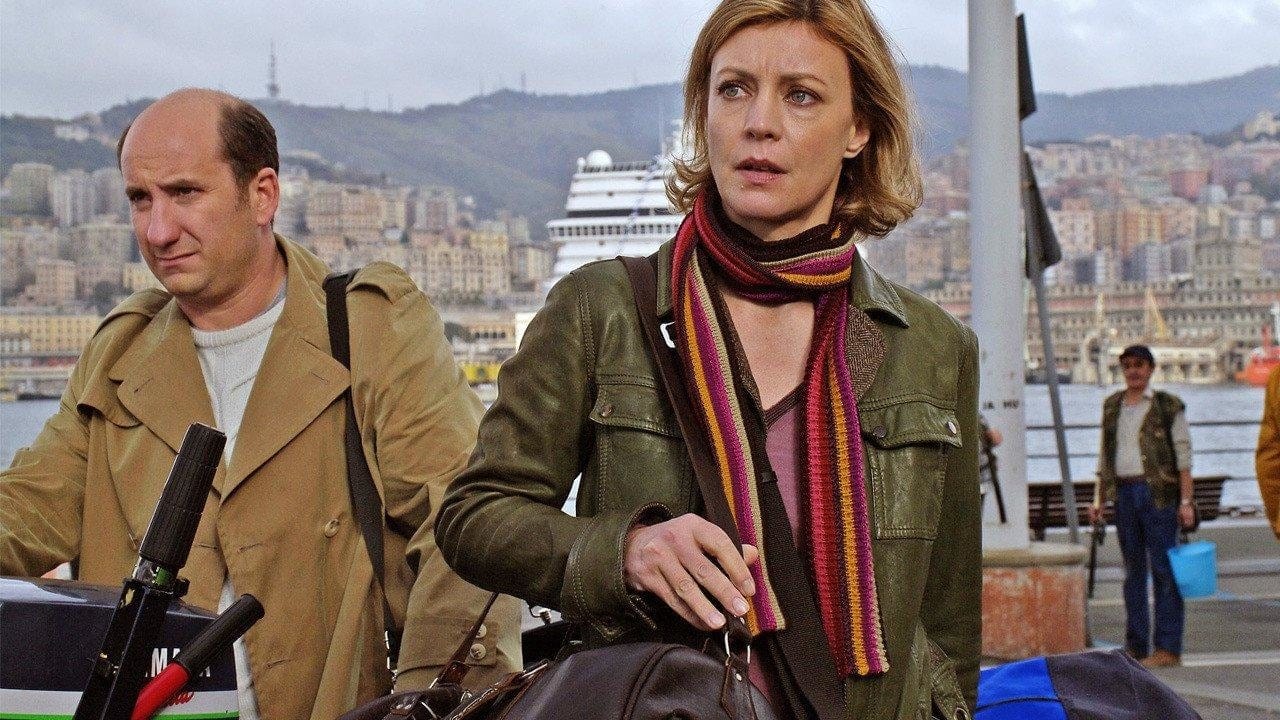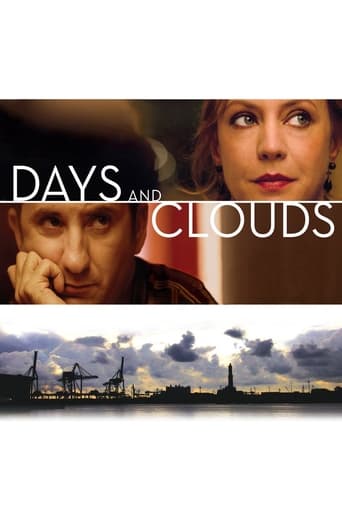

everything you have heard about this movie is true.
... View MoreBetter Late Then Never
... View MoreThe plot isn't so bad, but the pace of storytelling is too slow which makes people bored. Certain moments are so obvious and unnecessary for the main plot. I would've fast-forwarded those moments if it was an online streaming. The ending looks like implying a sequel, not sure if this movie will get one
... View MoreThe movie is made so realistic it has a lot of that WoW feeling at the right moments and never tooo over the top. the suspense is done so well and the emotion is felt. Very well put together with the music and all.
... View MoreDays and Clouds (2007)Tender, true, and rather moving without being the slightest bit sentimental. This is a look at normal life, in a way, in modern Northern Italy (the setting is Genoa). A fairly comfortable middle aged couple is going through a crisis as one loses a job and the money crunch adds to other everyday stresses.And that's it. Which is a lot when you realize that that's it. There will be no murder or shocking accidents, no illness or surprise turn of events of any kind, really. Which is why it draws you further and further, gently, with more humor than pathos, until you really believe these people, or these kind of people, exist quite like this. It's not a random slice of life, since there is certainly a core problem being scrutinized (the loss of a job in mid-life, etc.). But in many ways the little events are so "little" in the cinematic sense they are just a small pageant for the viewer.So what makes it sing beyond the compelling, restrained story is the acting, above all the acting. The couple, the husband and wife facing the crisis, makes sense because the woman (Margherita Buy) and the man (Antonio Albanese) are so perfect at being imperfect. They don't push their crisis too hard, nor do that have the ideal love at the beginning. What they show is the normal troubled tenderness and awkward anger of getting into such a situation.Besides a second thread following somewhat their daughter's life, which has taken a less materialistic turn then the parents, the movie adds a whole other element throughout--early Renaissance art. The mother happens to have just finished (belatedly) her graduate degree in Italian art from the 1400s. And she is helping restore an obscure small ceiling painting somewhere else in town, seeing it gradually reveal itself as the movie progresses. The reason this matters is it adds an element of beauty and idealism that is implied by the whole rest of the movie. That we (all of us) are not simply here to make ends meet and worry about money. And this something bigger (call it art, call it something spiritual inspired by art or inspiring art) is what holds us up at times.So by the end the two aspects--the mundane and the ethereal--meld, every so softly. Quite beautiful.
... View MoreAfter three movies that elevated him from d'essai circuits in terms of box office results, director Silvio Soldini returns to more dramatic and current themes closer to his debuts. Middle-class families can't afford financial problems, that's seems to be the sense of the movie. Step after step all certainties and habits of a Genova's well off family, crawl down after Michele (Antonio Albanese) lost his work. Soldini as always, has the sensibility and the touch to treat such difficult material, but nevertheless the script (of the same author with Tiziana Leondeff) never reach the audience. The story advances laboriously, the non-core characters are just sketched and stereotyped, and most of all the main character, Antonio Albanese, not has the necessary depth, his Michele seems a man who could not accept the consequences of his actions, ever astonished by the behavior of the rest of human race, including members of his family. Early the movie slips toward a foreseeable descent, tell the truth, in the end there's a bit of relief. Great waste of talent for the performance of Margherita Buy, as always measured and effective. Awful soundtrack, by the way.
... View MoreIn this film about work and marriage by 'Bread and Tulips'director Silvio Soldini, a well-off Genoa couple has to face self-image, marriage, and work problems when their financial world crumbles. Right after Elsa (Margherita Buy of The Unknown Woman) passes her graduate exams in art history and her husband and friends give her a big surprise party to celebrate, the truth comes out. Michele (Antonio Albanese) reluctantly reveals to his wife that due to hard times, corporate restructuring, and his own stubbornness he's been pushed out of the firm he co-founded with Roberto (Alberto Giusta) and hasn't been working or receiving a salary for months. They're in debt. Everything has to change now.First off Elsa is furious at Michele for not telling her all this sooner. His judgment was that knowing would have made it hard for her to finish her graduate work, but now that she has to know, it angers her to have been lied to. Probably he was lying to himself, but he's forgotten that marriage is a partnership.Neither Elsa nor Michele knows how to adjust. One night they go out to dinner with friends and Michele insists on paying, even though the bill is over $300. Again Elsa is furious. Later, she finds it impossible to speak frankly to her best friend, Nadia (Carla Signoris). It pains her to confront people now that one by one their status symbols are being removed. In the face of loss, there's the typical denial. Everything seems shaky.Whether they're getting along or not, their beautiful apartment must be sold. Their maid, Daisy, must go to take a full time job, and they have to sell something to raise the money for her severance pay. Elsa has to give up her art restoration project--which was an adjunct to her graduate work and her passion but was unsalaried--and find a part-time job in telemarketing and in the evenings fill in as secretary to a shipping company boss. They haven't told their grown daughter Alice (Alba Rohrwacher) about any of this. Relations with Alice are painful because Michele doesn't approve of Ricky (Fabio Troiano), the boyfriend she lives with. Later he is to get down off his high horse when he learns Ricky's not such a bad guy. For now, they haven't told Alice.Michele looks for work, but has a hard time accepting offers that are, inevitably, all below what he's been used to. (This is another form of denial.) One day he's desperate to do something, anything. He takes a day job through an employment office delivering packages on a motorbike--and Alice sees him. So she finds out. Alice has previously used the money her parents had given her for university to open a restaurant. It's doing fine, and she works there. Alice is torn between anger at Michele and serious concern for her parents.Michele has failed to take what turns out to be the best offer he's going to get, so he falls into something utterly humble but somehow satisfying, because it's physical. He does minor rehab work with two of his former employees, Vito (Giuseppe Battiston) and Luciano (Antonio Carlo Francini), who were let go by his firm before he was. Signor Salviati (Paolo Sassanelli), the shipping boss Elsa secretaries for in the evenings, has a weakness for her and keeps flirting. His attentions are all the more tempting with things so rocky in her marriage, but she still resists--mostly. Michele gets increasingly depressed when Vito and Luciano get hired back in the shipping industry and he can't finish their rehab jobs on his own and no longer has their company. Now he doesn't even go to interviews and he has nothing to do but mope.This little Italian film's hard lesson--that economic disaster can happen to anybody--comes at all too good a time for an American audience. The question the film subliminally asks is to what extent relationships, sense of self, and peace of mind may all rest on a lifestyle--how much economic security or its absence can change everything. Now that Elsa and Michele's "days" are full of "clouds" and their nerves are on edge (and Elsa is exhausted from her new make-do jobs), they get into fights easily. It's not certain their marriage will survive. After a fight, Michele sleeps over one night with Ricky and Alice. This is when he sees that Ricky's a good guy. It's also clear now they're lucky Alice has made herself financially independent.Elsa's restoration project, which we see her presenting during the opening credits, involves unearthing a fresco that may be the work of an early renaissance painter she's interested in. Toward the end of the film, she returns to the project and finds that her intuitions were correct. She's vindicated, her professor is admiring, and this becomes a metaphor for discovering a future. In the final scene, Elsa and Michele agree to forget the past and move forward as best they can. Their losses have taken them back to basics and to honesty with each other and their daughter.While this starts with a premise like that of Laurent Cantet's 'Time Out' of a man hiding that he's been pushed out of the corporate world, the development here is much more practical and everyday. The film succeeds because of a lack of tricky plot developments, and the charisma and polish of Buy and Albanese. Soldini does a splendid job of evoking the upper-middle-class lifestyle the couple lives in Genoa. Events are nerve-wracking because they're living so much on the edge. This is probably a more common situation than it used to be. It's not very hard to identify with the couple and feel the day-to-day insecurity they suddenly live with. The security blanket is easily ripped. In a world of globalization and ever more rapacious capitalism, the upper bourgeoisie is yet another new proletariat, and 'Days and Clouds' is a sympathetic portrayal of what that may mean.
... View MoreA great follow up to Bread and Tulips, this story focuses on the other end of the spectrum of a relationship. As the movie progresses and the situation of the characters worsens, you begin to see subtle changes in the manner the couple interacts with each other, kudos to the fine actors for portraying such intimate and fragile emotions so realistically.Does love conquer all? Silvio Soldini (who was present after the world premiere of this in Toronto to comment on this question) isn't sure if it does, but he's hopeful. Decide for yourself and watch this film as he takes you on a journey of the highs and lows of a middle-aged relationship.
... View More